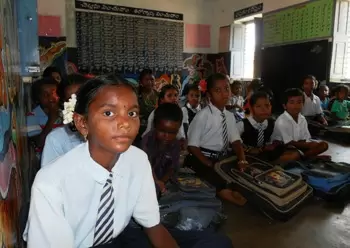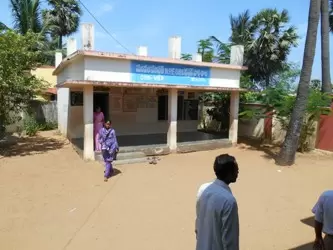For a people immersed in the sea, a few classrooms show a ray of hope

30-August-2013
Vol 4 | Issue 35
Schooling for an earlier generation of fisher folk was practically non-existent. This is why the cheerful, whitewashed primary school run by the government – the Mandal Praja Parishad School - in the fishing village of Appikonda, about 18 kilometres from downtown Visakhapatnam in Andhra Pradesh is so important.
Catering to classes from nursery to Class Five, it has 72 pupils – 41 girls and 31 boys – all of whom are from the fishing community.
 |
|
The Mandal Praja Parishad School caters to classes from nursery to class five (Photos: WFS)
|
The origins of this village are lost in the mists of time, as is evident from a 13th century Shiva temple dating back to the Chola dynasty that towers over the landscape. But Appikonda’s hoary beginnings notwithstanding, modern times have intruded most rudely into its existence.
Today, it is under siege from the burgeoning industries of the region. First, there was the Visakhapatnam Steel Plant that came up, the Gangavaram Port followed a couple of decades later, now there is the soon-to-be commissioned Hinduja Power Plant in its backyard.
The land for these gargantuan establishments has been generously parceled out by the state government and, along with it, large slices of the coast on which the local fishing community pursued its traditional livelihood.
What has such development meant for the local fishing community? Arjilli Dasu, head of the District Fishermen’s Youth Welfare Association (DFYWA), which has been struggling for fishers’ rights for over a decade, elaborates, “We have struggled to keep a toehold on these sands, but every day brings news of new projects.
“We have been displaced so often from our ancestral fishing spaces that now we live in constant fear of being shunted out. Our children bear the brunt of this - the education of a whole generation gets disrupted when displacement takes place.”
For Dasu and his community, modest institutions like the Mandal Praja Parishad School hold out the possibility of a better future, which is why his organisation takes a close interest in this school.
As if to underline its primary purpose, a big notice board in the school premises states: Village Appikonda Chepalapalam. Total population: 1070. Literates: 408. Illiterates: 602.
“Our school is working to bring down the number of illiterates to zero,” states Ananthalakshmi, the headmistress of the school. It is an ambitious mission. For one, the dropout rates, even at the primary level, are high, with boys and girls discontinuing school for different reasons.
The boys, when they get older, often join the adult male members of the family for fishing leaving no time for school. As for the girls, it is the looming prospect of marriage that threatens their education.
“Once a girl has studied up to Class Five, they are in danger of dropping out, because parents are reluctant to send their daughters to the high school located in the main revenue village of Islampit, more than three kilometres away,” explains Ananthalakshmi.
Life for these children is not without its traumas. The boys who go out to sea are required to perform tasks under the punishing sun far beyond the capacity of their young bodies. Certain varieties like ray fish and spin fish can cause serious injuries as well.
The girls get involved in catching shrimp in the sea and backwaters and also suffer from skin diseases. According to local accounts, two thirds of wages earned by children are utilised by their families, while the rest is spent on cards, watching movies, smoking and even liquor, by the children themselves.
According to A. Janardhan Rao, one of the three teachers in the school, the lack of awareness of the parents is a big factor for indifferent schooling, “The parents are from the fishing community, which is facing hard times. Many of them have been forced to become wage labourers and cannot care for their offspring,” reveals Rao.
The school, in fact, functions as a safe haven. “If our children were not in school between nine and four, they would be vagrants on the sea shore, picking up little things to sell like shells, collecting water for the family, and so on. So the school is a life line for them – keeping boys from bad company and the girls away from early marriages,” says Ananthalakshmi.
Interestingly, the Mandal Praja Parishad School, aside from imparting Telugu and maths, also emphasises on environmental sciences. Its perceptive headmistress points out that it is important to give children “an education that will impact their lives”.
She says, “We notice, for instance, how our children love to go to the beach – the sea seems to have irresistible appeal for them. So we bring them information about the sea, even at this primary stage.”
 |
|
The school has motivated several children to continue their studies beyond class 5
|
Fisher activists like Dasu try and make a difference here by teaching the children to swim. They have even demonstrated to the kids how to stay afloat with the help of easily accessible material like plastic bottles, when disasters like cyclones strike.
The effort is now delivering results. Not only are the educational authorities now made to take more interest, parents in the community are coming to realise the value of education. Today, about 50 of the children who have completed Class Five from the Mandal Praja Parishad School are studying in high school, and the teachers here proudly reveal that a few of their students have even become graduates.
Y. Yasodha, a daughter of a fisher family, has just completed her fifth standard examination and will soon be going to high school in Islampit. A bright eyed child with her hair neatly held back by green pins and arranged in two doubled plaits that frame her face, she says she is really looking forward to going to her new school.
She then shows off coloured drawings that the younger students have made, with all the pride of a little teacher. When asked which one caught her fancy, Yasodha smiles and points to a crayon sketch. It shows a big yellow fish with pink fins, with a fisherman in a boat rowing in a patch of blue, behind which glows a bright red sun.
The sea and its fruit are clearly the dominating images in the lives of the students of Mandal Praja Parishad School. - Women's Feature Service














